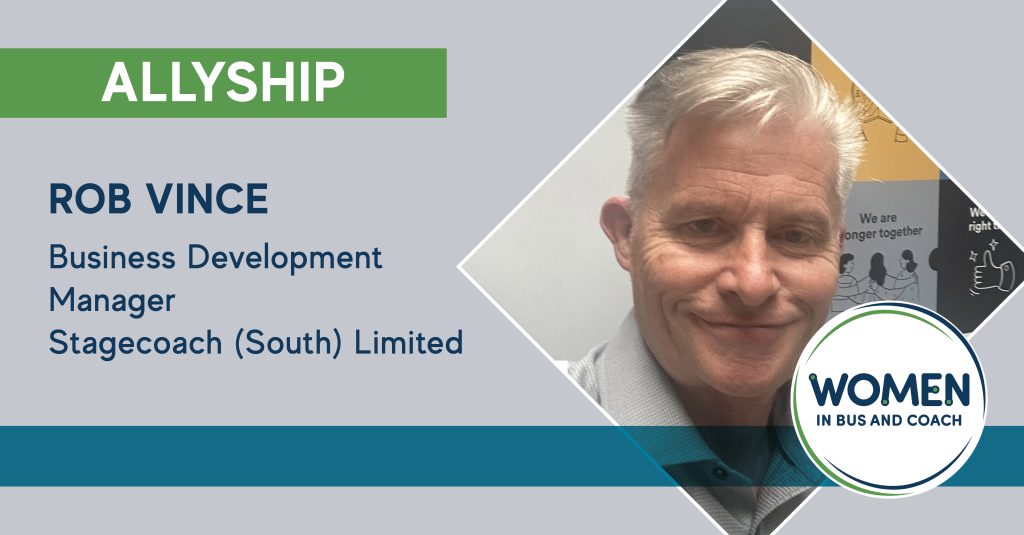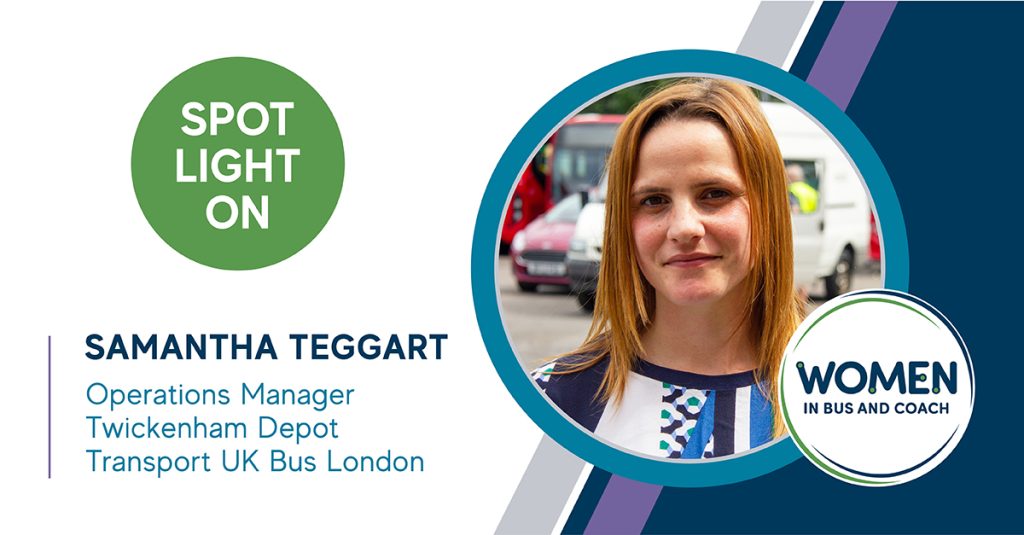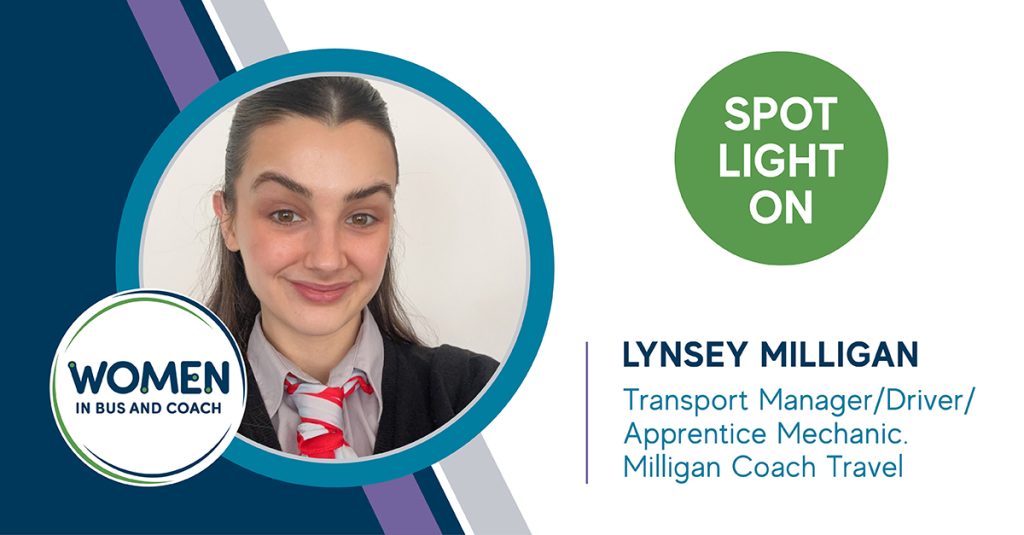Our Allyship initiative recognises individuals who have been allies in supporting and encouraging Women across the bus, coach, and community transport sector. Individuals who have contributed significantly to the professional growth and empowerment of women, whether through mentorship, advocacy, or creating opportunities for women to thrive, these allies have played a crucial role in promoting gender equality and diversity in our sector.
This initiative aims to encourage everyone to be allies, with the individuals featured sharing insights into their own professional career background, their ally approach, as well as providing suggestions and advice on how we all can be allies.
Today we hear from and learn about:
Rob Vince
Business Development Manager
Stagecoach (South) Limited
How did you get to where you are today?
A childhood passion for the sector was misplaced whilst following a stronger desire for business management experience in an SME. A career managing sales and marketing teams equipped me with the ability to get the most out of people. When my public transport interests were reignited, the bus industry presented the opportunity to put my talent to the test in an environment where keeping people focused, motivated and content was imperative.
That formed one of the key pillars that helped me to build stable, high-performing driving teams and my thirst to experience as many different environments as possible pushed me to move location every few years and take on a new challenge. Whilst most depots had similarities, there were also nuances but my ability to flex and adjust quickly helped me to take those transitions in my stride, resulting in a broader knowledge base and increased confidence. The willingness to be adaptable along with fearlessness of change made me the first candidate to be trusted when difficult projects emerged, expanding my knowledge and experience further still.
Although I’ve spent most of my career in the sector working in a reasonably compact geographical area, it was the chance to move hundreds of miles away to manage all aspects of a smaller business unit that realised those early business management aspirations. It gave me greater exposure to more commercial-based competencies and facilitated my progression to the role I hold now, where I am able to utilise all that expertise in the industry that has always excited me.
Did you experience any challenges getting to where you are today?
I probably took the predictable route of reverting to my strengths, which in isolation could have been a precarious path to tread. However, my communication skills were a key attribute, so I asked questions and did a lot of listening, at every opportunity and at all levels, adapting my approach as necessary. I found that being transparent about my limited industry knowledge and displaying an eagerness to learn led to most people being only too happy to share their own opinions and experiences. I got involved every new project that emerged and found that participation from someone who was not influenced by decades working in the sector was actually welcomed.
What do you like about the sector?
It’s forever evolving and how we’ve had to adapt post-pandemic has illuminated the need for agility. Trying to influence travel behaviour and arrest the car-dependant actions of the last 50 years isn’t easy but being involved in an industry that provides a more sustainable way to travel, reduce harmful emissions and help realise the associated health benefits for generations to come feels like a valuable role to play.
What does a typical day look like?
A normal day is made up of meetings with local authorities about bus-related highway and infrastructure improvements, speaking to businesses about incentivising the use of public transport for their employees, liaising with planning authorities and housing developers about how new settlements can be integrated to the bus network and working with community groups to help break down the barriers to bus travel.
Why does the sector need allies and how do you bring this into your role?
We are in an industry where changing people’s perceptions will continue to play a big part in how we evolve. For that we need new ideas and fresh perspectives. It’s important that everyone can contribute, have the confidence to get involved and feel like they belong. I have always been an advocate of making people feel part of a team, whatever their background and whatever role they play. I make time for people, I listen a lot and I’m always happy to be that person to bounce ideas off. Recognising small changes in someone’s mood or attitude and sensitively supporting and encouraging them can help their mental health and maintain the confidence and motivation to perform to their full potential. I have championed a number of people over the years and there’s no better feeling than watching them progress and develop their careers. They’ve taught me a few things along the way too!
Why is diversity important?
We serve diverse communities. Deciding on a solution without properly evaluating all the factors involved is a dangerous trap to fall into. It leads to predictable outcomes and non-progressive results. Understanding as many different perspectives as possible can help inform much better decision making and provide self-value and validity to those involved.
What changes have you made in your role to support women and to encourage more women into the bus, coach and community transport sector?
I have actively encouraged women into our industry, both through individual interactions and supported advertising designed to do so. The percentage of women working in any location has always increased under my leadership. I have appointed women to key positions, such as driving instructors, both to give them better opportunities and make the environment more welcoming for others. Offering my support to their ideas in a male-dominated decision making environment can sway opinions, include ideas from a new perspective and achieve better outcomes.
What advice when you give to other men in the bus and coach sector to be a supportive ally?
Look for talent, regardless of their background, help them learn, let them adapt your concepts, help them avoid pitfalls, encourage them to speak up and make them believe they can achieve whatever they want to.
What could the sector do collectively together to change for the better?
Design from the inside out. The commercial models usually mean we have the answer we want at the start. We can adapt that process to make outcomes based on people rather than pure economics. We have to start believing that there is commercial reward in valuing people properly. We can derive stronger, happier workforces and larger, more diverse customer bases.
Anything else you would like to share?
I firmly believe the issues we’ve talked about help to create and more productive environment and make sure everyone has a chance to shine. But, we live in an era where personal development is paramount and people move jobs frequently, with a long but hastily acquired list of achievements under their belts. There is a danger this fosters workplaces filled with people interested only in themselves and addressing this, without stifling that individual progression, is a challenge we need to meet head-on and get the balance right with. Otherwise we risk ignoring a rich vein of talent who lack the initial confidence to project their abilities and benefit from shared knowledge, experience and coaching.
Thank you for sharing your story Rob and thank you for being an ally and your support of Women in Bus and Coach.
To find out more about who Rob works for and career opportunities visit: https://www.stagecoachbus.com/careers.


